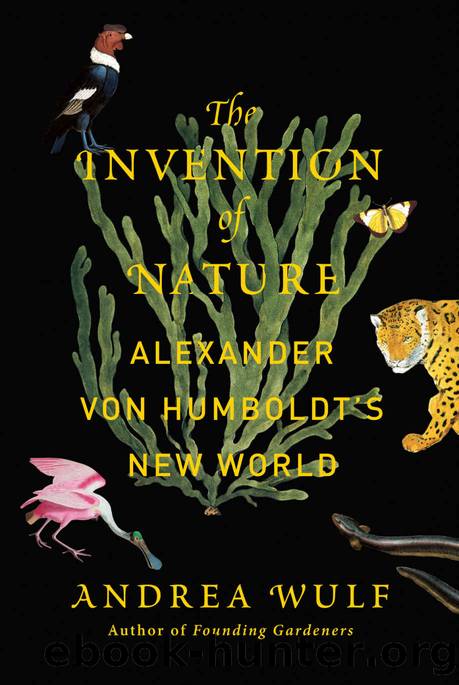The Invention of Nature: Alexander von Humboldt's New World by Andrea Wulf

Author:Andrea Wulf [Wulf, Andrea]
Language: eng
Format: azw3
ISBN: 9780385350679
Publisher: Knopf Doubleday Publishing Group
Published: 2015-09-14T16:00:00+00:00
Concord, Massachusetts (Illustration Credit 19.2)
Boston was still an important harbour and Thoreau’s hometown Concord just to the west was growing in tandem. Concord had a cotton mill, a shoe and a lead pipe manufactory as well as several warehouses and banks. Each week forty stagecoaches passed through the town which was also the seat of the county government. Wagons loaded with goods from Boston drove along Main Street towards the market towns in New Hampshire and Vermont.
Farming had long turned the wilderness here into open fields, pastures and meadows. It was impossible to walk through Concord’s woods, Thoreau noted in his journal, without hearing the sound of axes. New England’s landscape had changed so dramatically over the previous two centuries that few ancient trees remained. The forest had been cleared first for agriculture and fuel, and had then been devoured by locomotives with the advent of the railway. In Concord the railway had arrived in 1844, its tracks skirting the western edge of Walden Pond where Thoreau had often walked beside them. Wild nature was receding and humans were increasingly removed from it.
Life at Walden Pond suited Thoreau, for there he could lose himself in a book or stare at a flower for hours without noticing what else was happening around him. He had long praised the pleasures of a simple life. ‘Simplify, simplify’, he would later write in Walden. To be a philosopher, he said, is to live ‘a life of simplicity’. He was content on his own, and didn’t care about social pleasantries, women or money. His appearance mirrored this attitude. His clothes were ill-fitting, his trousers too short and his shoes unpolished. Thoreau had a ruddy complexion, a large nose, a straggly beard and expressive blue eyes. One friend said that he ‘imitates porcupines successfully’, and others described him as cantankerous and ‘pugnacious’. Some said that Thoreau had ‘courteous manners’ – although a little ‘uncouth and somewhat rustic’– while many thought him entertaining and funny. But even his friend and Concord neighbour, the writer Nathaniel Hawthorne, described Thoreau as ‘an intolerable bore’ who made him feel ashamed for having money, or a house, or writing a book that people will read. Thoreau certainly was eccentric, but also refreshing ‘like ice-water in the dog days to the parched citizens’, another friend said.
All agreed that Thoreau was a man more at ease with nature and words than he was with people. One exception was his joy in the company of children. Emerson’s son, Edward, remembered fondly how Thoreau always had time for them, telling stories about a ‘duel’ of two mud-turtles in the river or magically making pencils disappear and reappear. When the village children visited him at his cabin at Walden Pond, Thoreau took them on long walks through the woods. When he whistled strange sounds, one by one animals would appear – the woodchuck peeped out from the underbrush, squirrels ran towards him and birds settled on his shoulder.
Nature, Hawthorne said, ‘seems to adopt him as her especial child’, for animals and plants communicated with him.
Download
This site does not store any files on its server. We only index and link to content provided by other sites. Please contact the content providers to delete copyright contents if any and email us, we'll remove relevant links or contents immediately.
Sapiens: A Brief History of Humankind by Yuval Noah Harari(14368)
Sapiens by Yuval Noah Harari(5366)
Pale Blue Dot by Carl Sagan(4996)
Homo Deus: A Brief History of Tomorrow by Yuval Noah Harari(4908)
Livewired by David Eagleman(3765)
Origin Story: A Big History of Everything by David Christian(3687)
Brief Answers to the Big Questions by Stephen Hawking(3429)
Inferior by Angela Saini(3311)
Origin Story by David Christian(3195)
Signature in the Cell: DNA and the Evidence for Intelligent Design by Stephen C. Meyer(3132)
The Gene: An Intimate History by Siddhartha Mukherjee(3094)
The Evolution of Beauty by Richard O. Prum(2993)
Aliens by Jim Al-Khalili(2827)
How The Mind Works by Steven Pinker(2813)
A Short History of Nearly Everything by Bryson Bill(2689)
Sex at Dawn: The Prehistoric Origins of Modern Sexuality by Ryan Christopher(2522)
From Bacteria to Bach and Back by Daniel C. Dennett(2481)
Endless Forms Most Beautiful by Sean B. Carroll(2474)
Who We Are and How We Got Here by David Reich(2431)
